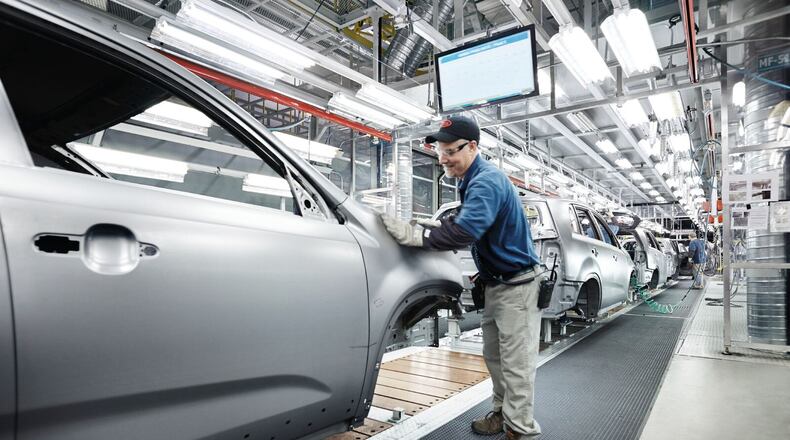At its plant on Georgia’s western edge, Kia Motors Manufacturing halted production last month, idling nearly all of its 2,400 workers.
The Toyo Tire plant in Bartow County in North Georgia is closed. So are two plants operated by Serta Simmons Bedding in Grovetown near Augusta and Waycross in South Georgia.
Meanwhile, at Vero Biotech in Atlanta, production is now running seven days a week, 10 hours a day. The 12-year-old company makes medical devices that are used in the treatment of patients in cardio-pulmonary distress.
"Our No. 1 challenge is ramping up to meet demand," said Brent Furse, chief executive and president.
In Georgia, all manufacturers have been touched in some way by the coronavirus pandemic that is spreading across the globe. But exactly how they’ve been touched depends on what they make.
"We are probably at about 60% of full production in Georgia," said Jason Moss, chief executive officer of the Georgia Manufacturing Alliance, which organizes industry events.
The sector accounts for more than 400,000 jobs and much of the state’s exporting.
Factories that have closed down were hampered mostly by plunging demand for consumer goods or lack of some materials needed for production. None has been forced to close because of rampant sickness, said Moss.
The virus first emerged in December in China, which responded by shutting down whole regions of the country. That meant the production of goods destined for use on assembly lines came to a sudden stop, causing supply chains gaps that eventually reached the United States.
On March 30, Kia Motors Manufacturing Georgia in West Point, the state's only auto assembly plant, had to temporarily cease operations.
"The reason for our stoppage is the supply chain issue," said Rick Douglas, senior manager for team relations at Kia. "That will eventually resolve. As soon as that happens, we will start back."
Kia announced Monday that paid volunteers at its plant would start producing face shields in response to the nationwide shortage of personal protection equipment.
And, right now, the plant is scheduled to begin regular production again next week, said Douglas.
Many manufacturers are not optimistic. A survey released last week by the New York Federal Reserve bank showed 85% of manufacturers reporting worsening conditions. A separate report showed the worst plunge in production since 1946.
"I would say the situation on the ground is pretty dire," said Chad Moutray, chief economist for the National Association of Manufacturers. "And I expect the numbers to continue to weaken."
Nearly 1 million Georgians have filed for unemployment benefits in the past month, many of them factory workers. But manufacturing's slide also hits other sectors as well: the restaurants near plants, the companies that deliver food, the truckers that bring materials.
“For every manufacturing worker, there are five workers elsewhere that are supported by manufacturing,” Moutray said.
A vast network of trucks and warehouses connects the plants to suppliers. That archipelago is intact, but the economic retreat of the past month is taking a toll, said Ken Adamo, chief of analytics for DAT Freight & Analytics, which tracks the industry.
“They are moving less freight at lower prices, which is not a good combination,” he said.
However, producers right now can get what they need, said Rick Williams, business partner for operations, JPG Resources, which analyzes supply and distribution networks.
“At this point, we are not seeing any breaks in the supply chain,” he said. “We have seen some cracks here and there.”
Manufacturers who continue to operate are adding what analysts call “friction,” — that is, actions that make workers safer but slow the process.
For example, Medline Industries is still making incontinence products like adult briefs and underwear in a 1 million square-foot Lithia Springs plant. The company has no one yet who has tested positive for the virus, but has added temperature checks, masks, and social distancing, according to a spokesman.
Meanwhile, some plants have shifted operations to goods needed because of the pandemic. For example, Heritage Sleep Concept, a mattress company in Rome, has been churning out protective equipment badly needed at medical centers.
YKK, which typically makes zippers and buttons at its Macon facility, is turning more attention to making fastening products for medical masks and hospital gowns.
And some factories are not only still operating during the crisis, their business has boomed because of it. With much of the American population huddled in their homes, the consumer market for basic goods has surged.
For example, Georgia-Pacific has 15 facilities in the state employing more than 7,300 people. Eleven of the manufacturing plants making paper towels, toilet paper and various other household products.
Starting in mid-March, demand for company products soared.
"Most of the operations are still running, and we increased production where we could," said Eric Abercrombie, company spokesman. "With toilet paper, for example, we are making 1.5 million more rolls per day. And we were running pretty good as it was."
And a few companies are making products that are targeted at the medical crisis itself. Vero can’t expand fast enough. It has 125 employees and plans to hire about 100 more.
Georgia manufacturing’s pre-virus snapshot
Annual output: $63.57 billion
Work force: 408,000
Average annual pay: $66,000
Source: National Association of Manufacturing
About the Author
Keep Reading
The Latest
Featured



